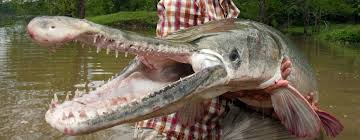
TPWD Inland Fisheries Staff Considering Alligator Gar Regulation Changes
AUSTIN – Texas Parks and Wildlife Department Inland Fisheries management staff are considering changes to regulations and harvest reporting requirements for alligator gar, Texas’ largest and longest-lived freshwater fish species.
Inland Fisheries staff previewed the potential changes to the Texas Parks and Wildlife Commission at their meeting held yesterday in Mission.
“The commission expressed their concern to us about the harvest of alligator gar on the Trinity River and directed us to propose regulations to eliminate harvest of large alligator gar,” said Dave Terre, TPWD Chief of Inland Fisheries Management and Research. “To meet this desire, we looked at a variety of options, but the potential changes we landed on aim to protect the sustainability of Texas’ world-class population of alligator gar while still allowing the harvest of some smaller gar.”
On the Trinity River, potential changes include instituting a 4-foot maximum length limit, meaning anglers could not harvest any alligator gar over that length, from the I-30 bridge in Dallas to the I-10 bridge in Chambers County. There would be no change to the 1-fish per day bag limit.
“This length limit would protect enough spawning-aged females to reproduce and provide plenty of large, recreationally-valuable fish for anglers to catch in the Trinity River,” Terre said. “It would also allow all anglers the opportunity to harvest one alligator gar up to four feet daily.”
The potential changes would also require anglers harvesting alligator gar statewide to report their harvest within 24 hours online or through a mobile app. Anglers would be required to submit the date, general location, size, and method of harvest.
“Because relatively few alligator gar can be sustainably harvested each year, and interest in alligator gar fishing has increased, it is critical that we closely monitor harvest numbers and locations,” Terre said. “This is a key piece of information that is difficult for us to gather in any other way than through a mandatory harvest reporting system. This information will be needed to refine our management of alligator gar populations further.”
In a survey conducted by TPWD’s Heart of the Hills Fisheries Science Center this summer, anglers surveyed indicated the Trinity River was the most popular destination for alligator gar fishing. The Trinity is considered by many to be Texas’ premier alligator gar fishery. Of nearly 3,500 people who offered opinions on regulations, around 75 percent of rod-and-reel anglers and a little over 50 percent of bow anglers indicated support for length limits and harvest reporting for alligator gar.
Statewide, a one-fish-per-day bag limit would remain in effect. A daily bag limit of 5 fish and possession limit of 10 fish would stay in effect for Falcon Reservoir.
In January, Inland Fisheries staff will present regulation proposals on these possible changes to the Texas Parks and Wildlife Commission. If the commission agrees, they will give the staff permission to publish the proposed changes in the Texas Register, which begins the process of official public comment. Before that, anglers with comments on the potential changes can direct them to Dave Terre (dave.terre@tpwd.texas.gov; (512) 389-4855). The commission will meet in March to vote on all changes to fishing and hunting regulations.








 EastTexasRadio.com Powered by Ten Stations
EastTexasRadio.com Powered by Ten Stations




